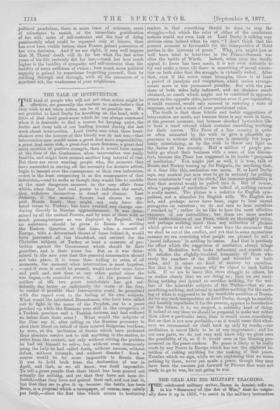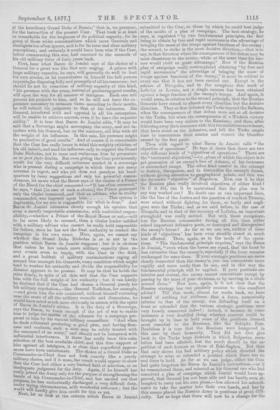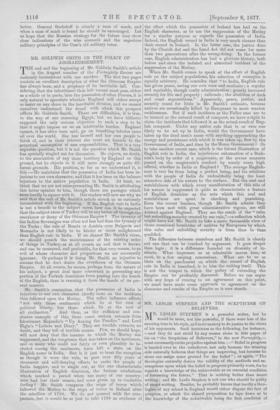THE CZAR AND HIS MILITARY TEACHING.
THE celebrated military writer, Baron de jomini, tells us, in his "Summary of the Art of War," that he origin- ally drew it up in 1836, "to assist in the military instruction
of the hereditary Grand Duke of Russia," that is, we presume, for the instruction of the present Czar. That book is at least as remarkable for the largeness of its political sagacity, for its grasp of those wider considerations which mere Generals and strategists too often ignore, as it is for its terse and clear military conceptions ; and certainly it would have been wise if the Czar, before commencing this war, had recurred to the counsels of his old military tutor of forty years back.
First, hear what Baron de Jomini says of the choice of a General for a great war like that now waging. A prince with large military capacity, he says, will generally do well to lead his own armies, as he concentrates in himself the full powers requisite/or disposing fully and promptly of all his resources; but should he not be conscious of military capacity of this kind, "his presence with the army, instead of producing good results, will open the way for all manner of intrigues. Each one will present his projects to him, and as he will not have the ex- perience necessary to estimate them according to their merits, he will submit his judgment to that of his intimates. His General, interfered with and opposed in all his enterprises, will be unable to achieve success, even if he have the requisite ability.' It is true that Baron de Jomini adds, "It may be said that a Sovereign might accompany the army, and not in- terfere with his General, but on the contrary, aid him with all the weight of his influence. In this case, his presence might be productive of good results." And of course it is conceivable that the Czar has really borne in mind this 'weighty criticism of his old tutor's, and used his influence only to support the Grand Duke Nicholas, not to team and embarrass him by premature or ex post facto doubts. But even giving the Czar provisionally credit for the very difficult reticence needed in a sovereign who is presentduring a campaign in which there are many reverses to regret, and who yet does not paralyse his head- quarters by fussy suggestions and only too powerful remon- strances, let us see what the Baron says of the choice of a Prince of the Blood for the chief command :—"It has often occurred," he says, "that [in case of such a choice] the Prince possessed only the titular command, and that an adviser, who in reality commanded, was imposed upon him This system is deplorable, for no one is responsible for what is done." And Baron. do Joinini intimates clearly enough his opinion that even a merely respectable commander, with undivided respon- sibility,—whether a Prince of the Royal House or not,—will be far more likely to succeed, than a titular leader saddled with a military adviser who cannot be really held responsible for failure, since lie has not the final authority to control the campaign in his own name. Here, again, we cannot say whether the Grand Duke Nicholas is or is not in the position which Baron de Jomini supposes ; but it is obvious that unless he has much more military capacity than re- cent events seem to imply, with the Czar in the field, and a great hubbub of military recriminations raging all around him amongst his Generals, every condition which might tend to weaken his authority and divide the responsibility for disaster appears to be present. It may be that he holds the reins firmly, in spite of all this, and that the Czar supports him with the full weight of his authority ; but it can hardly be doubted that if the Czar had chosen a General purely for his military reputation,—like General Todleben, for example, —and given him the sole command, without himself venturing near the scene of all the military councils and dissensions, he would have acted much more obviously in unison with the spirit of Baron de Jonaini's advice, It is the duty of a Sovereign,
says the Baron, to learn enough of the art of war to enable him to judge the merits of the schemes for a campaign pro-
posed to him by his varioes military counsellors. "And when he finds a General producing a good plan, and having firm- ness and coolness, such a man may be safely trusted with the command of an army," and should not be hampered with influential interference. If there has really been this calm selection of the best available chief, and this firm support of him against all intrigues, it is clear that superficial appear- ances have been unfortunate. The choice of a Grand Duke u e Commander-in-Chief does not look exactly like a purely military choice, and if it were, the result would appear to show that the Czar had either a very limited field of selection, or an inadequate judgment for the duty. Again, if lie himself has really joined the Army only for the purpose of strengthening the hands of his Conamander-in-Chief, and has carried out that Purpose, he has undoubtedly discharged a very difficult duty, under trying circumstances with wonderful reticence but the world will hardlyg ive hill): credit for this as yet.
Next, let us look at the criteria which Baron de Jomini
submitted to the Czar, as those by which he could best judge of the merits a a plan of campaign. The best strategy, he says, is regulated " by two fundamental principles, the first being to obtain by free and rapid movements the advantage of bringing the mass of the troops against fractions of the enemy ; the second, to strike in the most decisive direction,—that is to say, in that direction where the consequences of his defeat may be most disastrous to the enemy, while at the same time his suc- cess would yield no great advantage." Now if the Russian plan of campaign really contemplated obtaining "by free and rapid movements" the advantage of bringing the mass of troops against fractions of the enemy," it must be evident to every one that it has not been carried out. Except in the seizure of Nicopolis, and in the recapture this week of Loftclia or Lovatz, not a single success has been obtained against a largo fraction of the enemy's troops. And a.gain,.it would seem, in relation to the second principle, that the Russian Generals have struck in almost every direction but the decisive direction. They at first defeated the Turks beyond the Balkans, when the consequences of that defeat were not at all decisive to the Turks, but when the consequences of a Turkish victory would have been very serious to the Russians; and then, after frittering away their resources with this too ambitions movement, they have stood on the defensive, and left the Turks ample time to concentrate their armies and correct the blunders caused by the first panic.
Then with regard to what Baron de Jomini calls "the objective of operations." Ho lays it down that there are two very different kinds of "objectives of operations." There are the "territorial objectives,"—i.e., plans of which the object is to get possession of an enemy's line of defence, of his fortresses or entrenched camps. The other kind consist in the attempt to destroy, disorganise, and to demoralise the enemy's forces, without giving attention to geographical points, and this was the favourite "objective" of Napoleon. Now, can it be that the Russian plan really involved objectives of either kind ? Or if it did, can it be maintained that the plan was in any way worked out? No doubt one or two important
like the line of the Jantra and the junction of roads at Tirnova, were seized without fighting for them, so tardy and negli- gent were the Turks ; and as we said before, in the case of Nicopolis and in that of the recovery of Loftelia, an important stronghold was really carried. But with these exceptions, has the Russian commander during all this time either seized important defensive posts, or destroyed and disorganised the enemy's forces ? As far as we can see, neither of these kinds of i objectives' has been even steadily aimed at, much less effected, Then, again, as to the mode of the opera- tions. "The fundamental principle requires," says the Baron de Jomini, even when the forces are equal, that the front be less extensive than the enemy's, especially if the front remains unchanged for seine time. If your strategic positions arc more closely connected than the enemy's, you can concentrate more rapidly and more easily than he can, and in this way the fundamental principle will be applied. If your positions are interior and central, the enemy cannot concentrate except by passing by the mass of your divisions, or by moving in a circle around them." Now hero, again, is it not clear that the Russian strategy has run precisely counter to this excellent advice ? Till this week, almost for weeks back, we have heard of nothing but evidence that a force, numerically inferior to that of the enemy,. was defending itself on a front so extended that the various strategic positions were very loosely connected indeed ; indeed, it became in some instances a very doubtful thing whether reserves could be brought up in time to hold some of the positions deemed most essential to the Russians, like the Schipke Pass. Doubtless it is true that the Russians were hampered in this case by their humanity. They did not dare give back to the Turks large districts in which Bulgarian revo- lution had been effected, lest the result should be the re- petition of such horrors as those of Eski-Saghra, But then that only shows the bad military policy which directed the attempt to seize so extended a position which there was no real force to hold. As far as we can judge, either the Czar had quite forgotten the Baron de Tomini's instructions,—or if he remembered them, and selected as his General one who had conceived a plan of campaign which Jomini would have ap- proved, that General has not been able and has hardly even at- tempted to carry out his own plans,—has allowed his subordi- nates to take the matter into their own hands, and has by this means placed the Russian Army in positions of great diffi- culty. Let us hope that there will now be a change for the
better. General Beebeloff is clearly a man of mark, and when a man of mark is found he should be encouraged. Let us hope that the Russian strategy for the future may show clear indications of the wise counsels and the sagacious military Finciples of the Czar's old military tutor.
































 Previous page
Previous page